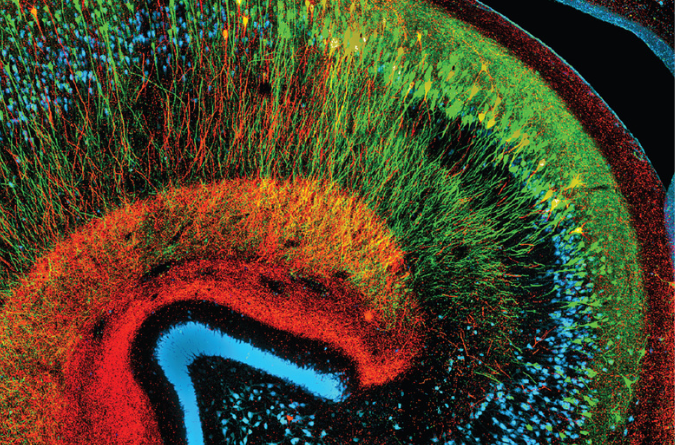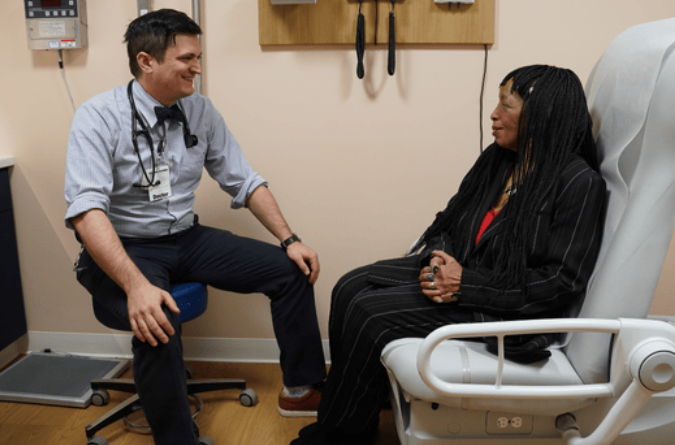Our Research Topics
-
Cognition
Cognition research at UC Davis explores how the brain processes information, covering areas like memory, perception, and decision-making. Researchers use neuroimaging, computational modeling, and behavioral experiments to study cognition in humans and animals. The Center for Mind and Brain fosters interdisciplinary collaboration, advancing understanding of learning, reasoning, and neural mechanisms.
- Charles DeCarli, M.D.
- Audrey Fan, Ph.D.
- Sarah Farias, Ph.D.
- Brandon Gavett, Ph.D.
- David Johnson, Ph.D.
- Jack Lin, M.D.
- Ron Mangun, Ph.D.
- Nigel Pedersen, M.D.
- Martin Usrey, Ph.D.
- Alyssa Weakley, Ph.D.
- Rachel Whitmer, Ph.D.
- Thomas Wingo, M.D.
-
Computational Neuroscience
Computational neuroscience research at UC Davis combines mathematical modeling, artificial intelligence, and neuroimaging to understand brain function. Scientists study neural networks, sensory processing, and cognitive dynamics using simulations and data analysis. The interdisciplinary approach, spanning psychology, engineering, and biology, advances insights into brain disorders, learning mechanisms, and artificial intelligence applications.
- Roy Ben-Shalom, Ph.D.
- Timothy Hanks, Ph.D.
- Nigel Pedersen, M.D.
-
Dementias
Dementia research at UC Davis focuses on understanding, diagnosing, and treating neurodegenerative diseases like Alzheimer’s. Scientists use neuroimaging, genetics, and biomarker analysis to study disease progression. The Alzheimer’s Disease Research Center fosters interdisciplinary collaboration, exploring risk factors, cognitive decline, and potential therapies to improve early detection and patient care.
- David Bissig, M.D., Ph.D.
- Charles DeCarli, M.D.
- Audrey Fan, Ph.D.
- Sarah Farias, Ph.D.
- David Johnson, Ph.D.
- Oanh Meyer, Ph.D.
- John Morrison, Ph.D.
- Alyssa Weakley, Ph.D.
- Rachel Whitmer, Ph.D.
- Thomas Wingo, M.D.
-
Epidemiology and Clinical Research
Epidemiology and clinical research at UC Davis investigate disease patterns, risk factors, and treatments to improve public health. Researchers study infectious diseases, chronic illnesses, and environmental health using biostatistics, genomics, and population studies. The collaborative approach advances medical interventions, health policies, and preventative strategies for diverse communities worldwide.
- Samantha Allen, M.D.
- Bradley Ander, Ph.D., M.B.A.
- Charles DeCarli, M.D.
- Oanh Meyer, Ph.D.
- Rachel Whitmer, Ph.D.
-
Epilepsy
Epilepsy research at UC Davis focuses on understanding seizure disorders through neuroimaging, electrophysiology, and genetics. Scientists investigate brain network dysfunction, novel treatments, and precision medicine approaches. The UC Davis Comprehensive Epilepsy Program advances diagnostics, surgical options, and therapeutic interventions to improve outcomes and quality of life for epilepsy patients.
- Samantha Allen, M.D.
- Caren Armstrong, M.D., Ph.D.
- Roy Ben-Shalom, Ph.D.
- Amy Brooks-Kayal, M.D.
- Kyle Fink, Ph.D.
- Marco Gonzalez, Ph.D.
- Jack Lin, M.D.
- Temitayo Oyegbile-Chidi, M.D.
- Nigel Pedersen, M.D.
- Neggy Rismanchi, M.D.
- Michael Rogawski, M.D., Ph.D.
- Sheela Toprani, M.D., Ph.D.
- Courtney Wusthoff, M.D.
-
Movement and Movement Disorders
Movement disorder research at UC Davis explores conditions like Parkinson’s disease, dystonia, and essential tremor. Scientists use neuroimaging, deep brain stimulation, and genetic studies to understand motor dysfunction. The interdisciplinary team develops innovative therapies, from drug treatments to neurosurgical interventions, aiming to improve patient mobility and quality of life.
- Sasha Duffy, D.O.
- Lin Zhang, M.D., Ph.D.
-
Neurodevelopment and Neurogenetics
Neurodevelopment and neurogenetics research at UC Davis examines how genes and brain development influence neurological disorders like autism and schizophrenia. Scientists use genomics, stem cell models, and neuroimaging to study brain formation and function. This interdisciplinary approach advances understanding of early brain development, genetic risk factors, and potential therapeutic strategies.
- Frederick Bassal, D.O.
- Roy Ben-Shalom, Ph.D.
- Amy Brooks-Kayal, M.D.
- Kyle Fink, Ph.D.
- Julian Halmai, Ph.D., M.Sc.
- Temitayo Oyegbile-Chidi, M.D.
- Neggy Rismanchi, M.D.
- Courtney Wusthoff, M.D.
-
Neuroimaging
Neuroimaging research at UC Davis utilizes advanced techniques like MRI, PET, and EEG to study brain structure and function. Scientists investigate cognition, neurodegenerative diseases, and psychiatric disorders. The interdisciplinary approach integrates engineering, neuroscience, and medicine to develop imaging biomarkers, enhance diagnostics, and improve treatments for neurological and mental health conditions.
- Audrey Fan, Ph.D.
-
Neuroimmunology and Demyelination
Neuroimmunology and demyelination research at UC Davis explores how the immune system affects the nervous system, focusing on conditions like multiple sclerosis. Scientists study inflammatory pathways, myelin repair, and neuroprotective therapies using molecular biology and imaging techniques. Their work advances treatments to slow disease progression and improve patient outcomes.
- Michelle Apperson, M.D., Ph.D.
- Frederick Bassal, D.O.
- Fuzheng Guo, Ph.D.
- John Morrison, Ph.D.
- Yan Wang, Ph.D.
-
Neuromuscular
Neuromuscular research at UC Davis investigates diseases like ALS, muscular dystrophy, and peripheral neuropathy. Scientists study nerve-muscle interactions, genetic factors, and disease mechanisms using electrophysiology, imaging, and molecular biology. The interdisciplinary team develops novel treatments, including gene therapies and regenerative medicine, to improve mobility and quality of life for patients.
- Ricardo Maselli, M.D.
- Hossein Mousavi, M.D.
- David Richman, M.D.
- Ge Xiong, M.D.
-
Neuro-oncology
Neuro-oncology research at UC Davis focuses on understanding and treating brain tumors. The Brain Tumor Program combines multidisciplinary expertise, including neurosurgeons, oncologists, and neuroradiologists, to provide comprehensive care. Researchers actively study tumor pathology and new treatments to improve patient outcomes.
- Orwa Aboud, M.D.
-
Neuro-ophthalmology and Vision
UC Davis' Center for Vision Science is among the nation's largest vision research programs, supported by National Eye Institute grants for over 25 years. The interdisciplinary team, including molecular biologists, psychologists, physiologists, neuroscientists, mathematicians, engineers, and clinical ophthalmologists, advances understanding of visual system mechanisms.
- Allison Liu, M.D., Ph.D.
- Martin Usrey, Ph.D.
-
Neuropsychiatry and Psychedelics
UC Davis' Institute for Psychedelics and Neurotherapeutics investigates how psychedelics influence brain function to develop novel treatments for mental health disorders. Led by Professor David E. Olson, the institute's research aims to harness the therapeutic potential of psychedelics while minimizing their hallucinogenic effects.
- John Gray, M.D., Ph.D.
-
Neurovirology
Our internationally renowned faculty investigate how viruses infect the nervous system, including the effects of immune activation following maternal viral infections. Our research spans model systems from rodents to nonhuman primates and humans, focusing on mechanisms of immune-mediated neurological damage and potential pathways for brain repair. Additionally, the UC Davis MIND Institute focuses on translational and clinical research in neurodevelopmental disabilities, including those influenced by viral infections.
- John Morrison, Ph.D.
-
Sleep
UC Davis' Sleep Medicine program specializes in diagnosing and treating sleep disorders, offering services like in-lab and home sleep studies. Their research focuses on the neuroscience of sleep, including how aging affects sleep regulation.
- Sasikanth Gorantla, M.D.
- Nigel Pedersen, M.D.
- Temitayo Oyegbile-Chidi, M.D.
-
Stroke
UC Davis researchers are investigating stroke mechanisms and therapies, focusing on brain injury prevention and repair. Their studies encompass surgical techniques, heat shock proteins, and novel drug therapies.
- Bradley Ander, Ph.D., M.B.A.
- Kevin Keenan, M.D.
- Kwan Ng, M.D.
- Frank Sharp, M.D.
- Boryana Stamova, M.S., Ph.D.
- Jeff Vitt, M.D.
- Lara Zimmermann, M.D.
-
Traumatic Brain Injury
UC Davis has led Traumatic Brain Injury (TBI) research for over 20 years, combining basic and clinical sciences to study how injuries affect brain function and behavior. Their work spans developing new models, identifying biomarkers, and creating therapeutic strategies to improve patients' quality of life.
- Krupa Savalia, M.D., Ph.D.
- Ryan Martin, M.D.



